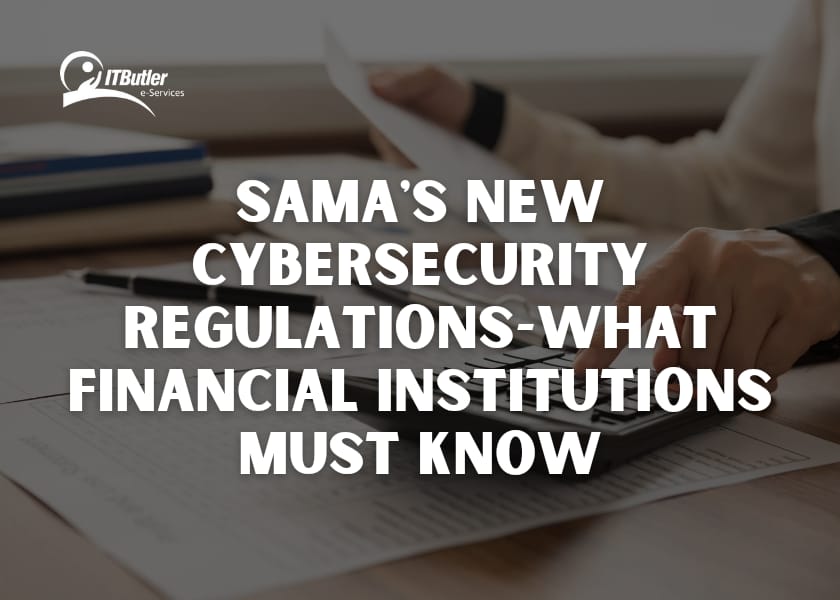Cybersecurity is no longer a choice for financial institutions but a necessity. Imagine running a bank. You have the vaults filled with money and sensitive client data, but hackers break into your system online. Scary, isn’t it? Therefore, it’s the right time to bring the SAMA Cybersecurity regulations into the market. However, SAMA has been proactive in developing principles, compliance guidelines, and cybersecurity regulations to protect banks and financial institutions.
But these new regulations are more about empowering tools, oversight, and the knowledge needed to operate securely. Therefore, we will highlight some of the most important things that financial institutions need to know about SAMA’s new regulations.
Why are SAMA Cybersecurity Regulations Important for Banks?
The prime target of hackers is the financial institutions. Why? Because hackers don’t just want your social media logins instead they need bags of money. However, the financial sector contains valuable data including:
- Customer information
- Investment records
- Histories of transactions
So, if cyber security measures are lacking, it’s like opening a vault of money with a sign saying “Help Yourself”.
Moreover, cyberattacks have been increasing against financial institutes over the years leading to potential breaches and losses. Therefore, SAMA has taken the increasing risk seriously and aimed to create new regulations. Their main focus is to:
- Safeguard banks
- Insurance companies
- Financial entities

Key Highlights of SAMA’s Cybersecurity Regulations
The main aspects of SAMA’s Cybersecurity Regulations are as follows:
1. Mandatory Cybersecurity Governance
Governance is the backbone of any sound cybersecurity policy framework. According to SAMA, all financial institutions need to develop a robust cybersecurity governance framework. Moreover, compliance officers and cybersecurity managers shall be named to monitor their practice.
SAMA’s “Compliance and Internal Audit Principles” in October 2024, directed that financial institutions can proactively manage their cybersecurity risks. Moreover, these principles clarify how the board of directors should ensure that all compliance and audit functions operate normally.
2. Risk Management Strategies
According to SAMA’s rules, institutions are expected to treat risk management as an integral part of their operations. Further, cyber risks are supposed to be measured, monitored, and responded to through banks.
Moreover, it is not merely about installing new software. It’s the true understanding of changes that keep occurring in cyber threats. Furthermore, creating new principles will become a guideline for mitigating risks.
3. Strengthen payment and financial systems
According to the July 2024 confirmation that payment systems in Saudi Arabia are safe, SAMA maintains the highest standards of cybersecurity. However, the pay systems in the financial industry must have to ensure that they remain safe from any prospective disruption.
The goal of establishing better security protocols is to prevent disruptions potentially caused by cyberattacks targeting the country’s financial backbone.
SAMA’s Cybersecurity Updates for Financial Institutions
Financial Institutions With Authorized Institutions
SAMA communicated in the updates of consumer microfinance companies in October 2024 that financial institutions should interact with authorized institutions. However, this is one of the critical steps to avoid third-party breach risk.
These SAMA cybersecurity regulations are expected to protect financial and credit institutions. Moreover, it also protects the customers from unauthorized activities, where only licensed companies can handle sensitive financial transactions.
Framework for FinTech and Digital Payments
The entry of FinTech companies has compelled SAMA to develop regulations that are in resonance with the innovations. Moreover, licensing BOUBA TSHIL and similar FinTech providers is a revelation of embracing financial technology on SAMA’s part.
This way, SAMA compels FinTech companies to position themselves through such frameworks. These frameworks ensure that newly established players in the financial ecosystem are well protected.
Real Estate and Finance Companies Under Security
SAMA published the Compliance Principles for Real Estate Refinance Companies in October 2024. However, they contained internal audit principles on cybersecurity of different industries. According to these, institutions have to do audits and compliance checks to ensure cybersecurity practices work well.
Strengthening Financial Stability in Global Cyber Threats
SAMA’s Financial Stability Report 2024 is a testament to the strength of the Saudi financial system. Due to cyber threats and economic uncertainty over financial markets, institutions stand out relatively strongly with a regulatory framework.
However, SAMA emphasizes the capital adequacy of Saudi banks and the continuous growth of financial assets. But regulations also play a very significant role in the security of the financial system.
Impact of SAMA Cybersecurity Regulations
So how do these new regulations change the way financial institutions operate? However, in terms of compliance, beginners have to do a lot of paperwork. But once it’s done, the benefits are better than the administrative hassle. Here’s why:
1. Improved security posture
The main goal of SAMA’s rules is to build a strong security posture. However, It’s almost like every branch has the latest and greatest security system. From monitoring network activity to acting on incidents, the rules are carefully crafted to keep threats away.
2. Enhanced Customer Trust
Let’s admit it, no one would like to bank with an organization that cannot secure their data. This means customers will be assured that their personal and financial data is secure. In this case, a bank with great cybersecurity measures can secure and protect the money and data.
3. Compliance with International Standards
SAMA’s cybersecurity regulations are the same as international standards and best practices. However, this sounds great news to those who seek to grow or expand globally. Compliance with international regulations means all financial services in Saudi Arabia will be able to operate on a global scale.
Challenges Financial Institutions May Face
Of course, implementing these regulations won’t be easy. For example, financial institutions could face a few hurdles along the way:
1. Cost of Implementation
An improvement in cybersecurity systems as well as adherence to the rules of SAMA may cost a lot of money. Therefore, banks will have to invest in new technology, hire cybersecurity experts, and train their employees appropriately. In other words, this is the same as getting a new vault system for every branch in the bank.
2. Keeping Up with Evolving Threats
Cyber threats keep on changing moment by moment. However, despite thinking that everything is under control, hackers can find new ways to break into it. Therefore, financial institutes need to be alert as well as change their security measures from time to stay ahead.
3. Resource Allocation
Not all financial institutions are alike. So, it could be expected that large banks to act fast in implementing the SAMA cybersecurity regulations. However, smaller financial institutions would face difficulties in the process of implementation. Thus, there should be resource reallocation or some external assistance for compliance.
Steps Financial Institutions Can Take to Comply with SAMA
We have discussed the benefits and challenges of SAMA cybersecurity regulations above. Now let’s have a look at how financial institutions can ensure to stay compliant:
- Conduct a Cybersecurity Audit
- Develop a Cybersecurity Strategy
- Provide Ongoing Training
- Monitor and Update Systems Regularly
Conclusion
SAMA cybersecurity regulations would be a game-changer for the financial institutions in Saudi Arabia. As they are no longer a question of just checking the boxes but making a healthier and safer financial environment. Of course, compliance does offer a headache, but this regulation will protect financial institutions from cyber threats.
In a world where hackers are always ahead of their time, SAMA’s regulations provide a hacker-proof vault in every bank. After all, there is something every financial institution should be on board with!
FAQs about SAMA Cybersecurity Regulations
-What are the principles of Sama financial sector cyber threat intelligence?
There are four principles of financial sector cyber threat intelligence:
- Core
- Strategic
- Operational
- Technical
-What is Sama regulation in Saudi Arabia?
SAMA is a banking regulator and must apply for a banking license. However, the Minister of Finance grants those licenses based on approval from the Council of Ministers. A parent entity of a foreign bank may apply to open branches in the Kingdom.
